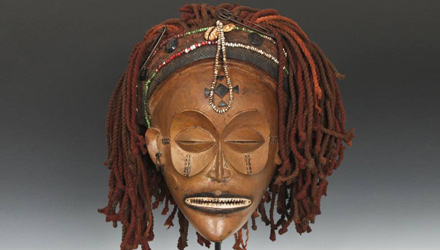
What constitutes power? In today’s western world, it may mean female equality – the chance for a woman to occupy any position available to a man – be it in politics, business, religion or the military. Yet, in traditional Africa, power was less about competing against men for their positions than it was about being given equal value and respect for the work they did. At times, this was domestic work ranging from farming to cooking; yet women also rose to political and religious positions, not as rulers or high priests, but in a capacity that could only be filled by their nurturing nature. The art of Africa frequently celebrates power and the distinguished role of women. The multitude of art forms flowing forth from the continent send the simple message that power and equality come in many beautiful, meaningful and relevant forms.
 |
What constitutes power? In today’s western world, it may mean female equality – the chance for a woman to occupy any position available to a man – be it in politics, business, religion or the military. Yet, in traditional Africa, power was less about competing against men for their positions than it was about being given equal value and respect for the work they did. At times, this was domestic work ranging from farming to cooking; yet women also rose to political and religious positions, not as rulers or high priests, but in a capacity that could only be filled by their nurturing nature. The art of Africa frequently celebrates power and the distinguished role of women. The multitude of art forms flowing forth from the continent send the simple message that power and equality come in many beautiful, meaningful and relevant forms.
 |
Edited by Glen Joffe
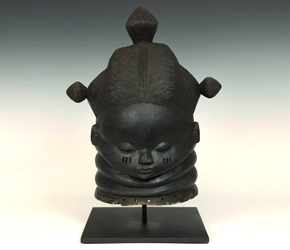 |
|
The U.S. presidential election is heading toward a finale and two faces are on newspapers and television screens all over the world. Will Donald Trump become the most unconventional and unpredictable U.S. president the world has ever known? Or will Hillary Clinton make history as the first woman President of the United States? The concept of men exclusively holding positions of power has reigned for so long; it’s difficult to even ascertain when it came to be. Yet, this long-standing ‘tradition’ is coming to an end. Angela Merkel, the Chancellor of Germany and the first woman to hold the position, is ranked by Forbes as the most powerful woman in politics. Park Geun-Hye also achieved the rank of being the first female president of South Korea in 2013. Even Ban Ki-Moon, the Secretary General of the United Nations, has suggested that the next person to hold his position should be a woman.
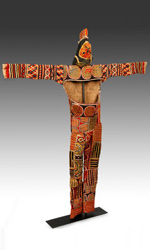 |
|
Although this may be perceived as hard won progress in the West and some Asian countries, there are many cultures across the globe where women traditionally ruled, or at the very least held men and women to be equally powerful. Think, for example, about the legendary Amazon warriors of Greek myths or female Vikings. Both were believed to have unrivaled supremacy in their societies. For that matter, the creation myth of many cultures begins with the worship of a female figure in the guise of the “Mother of all beings.” In Africa, often called the cradle of humankind, the importance and reverence of women can still be seen in the artwork of almost all tribal cultures. Female beauty has been celebrated for many centuries – both in terms of outward appearance and inward qualities – and it has been personified in all forms of art and adornment.
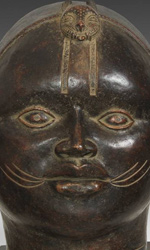 |
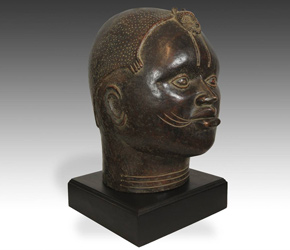 |
|
Many African cultures have historically given women great power, especially Queen Mothers. Queen Mothers are defined as women who give birth to a reigning king. Among the Benin people of pre-colonial Nigeria, Queen Mothers, known as Iyoba, held positions almost equal to the king. The Queen Mother had her own court and palace, held sovereignty over the kingdom’s subjects and even assisted the king in ruling. Although a woman only became the Iyoba once her son was announced king, it was believed her position was predestined and she held magical powers to aid her son during his rule. Upon the Iyoba’s death, her son would commemorate her with a royal portrait head made of bronze to be placed on an altar in the palace. One might say, this was a case where art followed life.
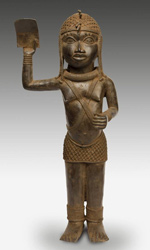 |
|
Young female attendants of the Iyoba were also given higher status than average girls. They were given to the Queen Mother to be raised, educated and refined, often growing up to become the wives of high chiefs or political leaders in neighboring areas. Some even had the potential to become the next Queen Mother. In artwork, these young attendants are featured mostly unclothed except for a beaded belt and jewelry adorning their neck, wrists and ankles. The reverence given to the Queen Mother and potential candidates was unique in the Benin Kingdom. Although technically patrilineal, or ruled by males, they shared power with females as a practical matter. While not all women achieved high status, the Queen Mother stood as a symbol of female power, prestige and political influence.
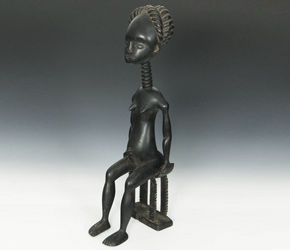 |
|
In other African nations, women held power because the culture was matrilineal, or practically ruled by women. The Akan people of Ghana are one such example. Women assumed all the domestic roles similar to other male oriented cultures, but because wealth and ownership of property were passed down through the mother’s lineage, women had control over their own farms and houses. They made pottery and engaged in small everyday trade, and whatever income they acquired was theirs to control and keep. This granted women a measure of financial independence found in few other cultures in Africa or elsewhere in the world. Elder women attained even greater social prestige as wise advisors to communities and as the ones with the most knowledge about lineages and kinships. This was especially crucial during discussions of succession rights, and male elders were required to consult female elders about such matters before any public declaration could be made.
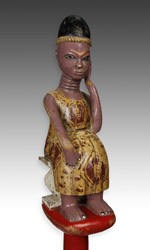 |
|
The importance of women in Akan culture can also be seen in the Ashanti tradition of stools. To the Ashanti people, a stool represents more than just a place to sit. The Golden Stool, which was believed to have descended from heaven to anoint the founder of the Ashanti Kingdom, is regarded as the soul of the Ashanti people. The only time it is revealed and displayed is in the king’s palace during the Adae Festival, a celebration of past kings and ancestors. During this important festival, the stools of other prominent chiefs and kings are also celebrated. Right beside them are the stools of past Queen Mothers, attesting to the importance Ashanti society placed on women.
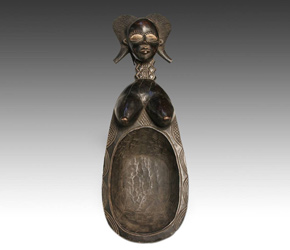 |
|
Historically, religious rituals and ceremonies in Africa were led by men. Yet, among the Dan people of Liberia the same position was given to women too. Both genders used art objects to perform their duties. For example, Dan males wore masks to harness the power of the Du, a spiritual energy; whereas women used a wunkirmien, or ceremonial ladle, to do the same thing. A woman utilized a wunkirmien to render acts of enormous hospitality and generosity and was elevated to the highest spiritual position possible, one of supreme honor and respect equal to any man. Consequently, the owner of a wunkirmien ladle would often dance alongside masquerading men as equals.
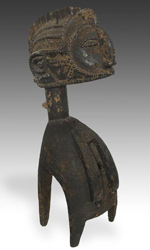 |
|
What constitutes power? In today’s western world, it may mean female equality – the chance for a woman to occupy any position available to a man – be it in politics, business, religion or the military. Yet, in traditional Africa, power was less about competing against men for their positions than it was about being given equal value and respect for the work they did. At times, this was domestic work ranging from farming to cooking; yet women also rose to political and religious positions, not as rulers or high priests, but in a capacity that could only be filled by their nurturing nature. The art of Africa frequently celebrates power and the distinguished role of women. The multitude of art forms flowing forth from the continent send the simple message that power and equality come in many beautiful, meaningful and relevant forms.
 |